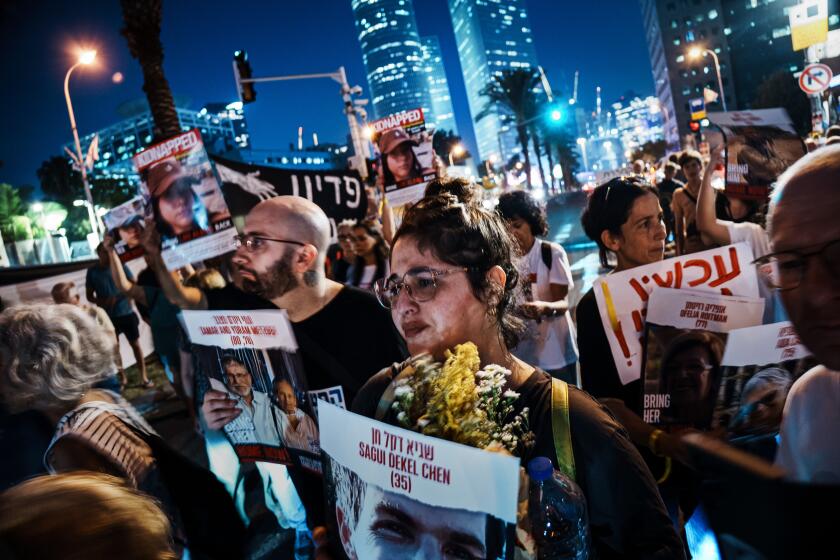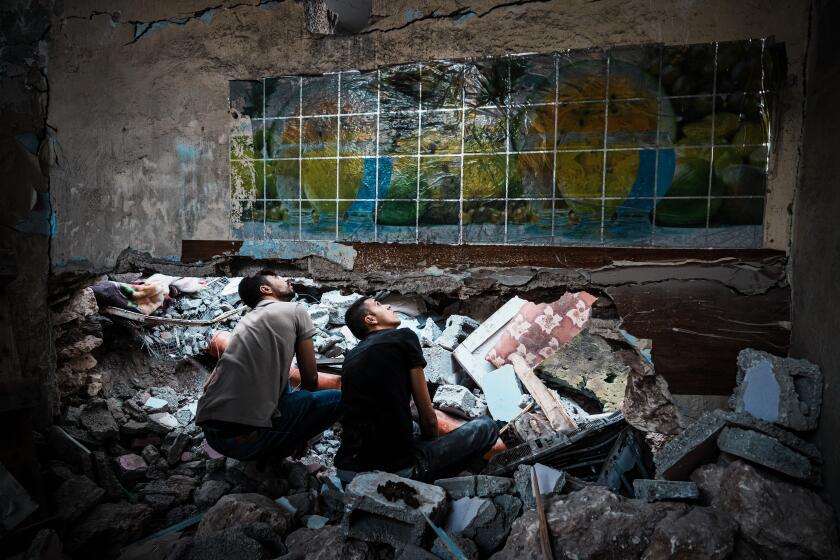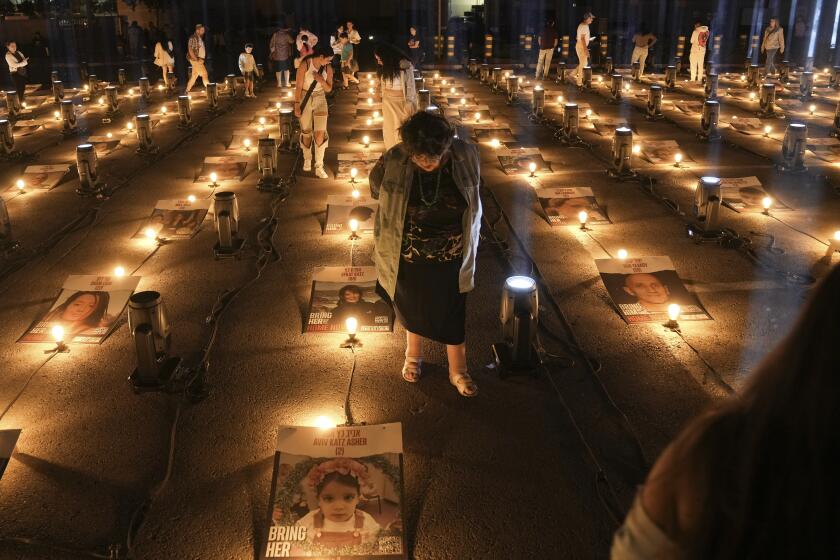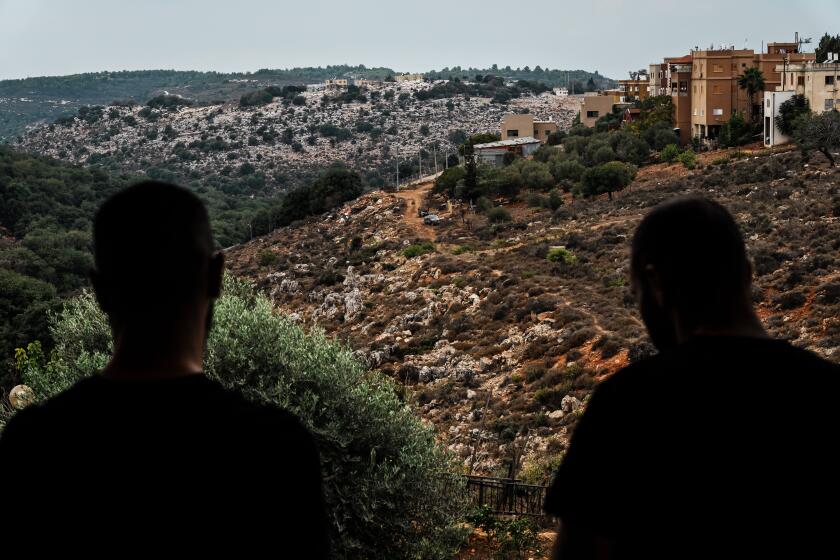Biden says 74 U.S. dual nationals have left Gaza as he dispatches Blinken to Mideast
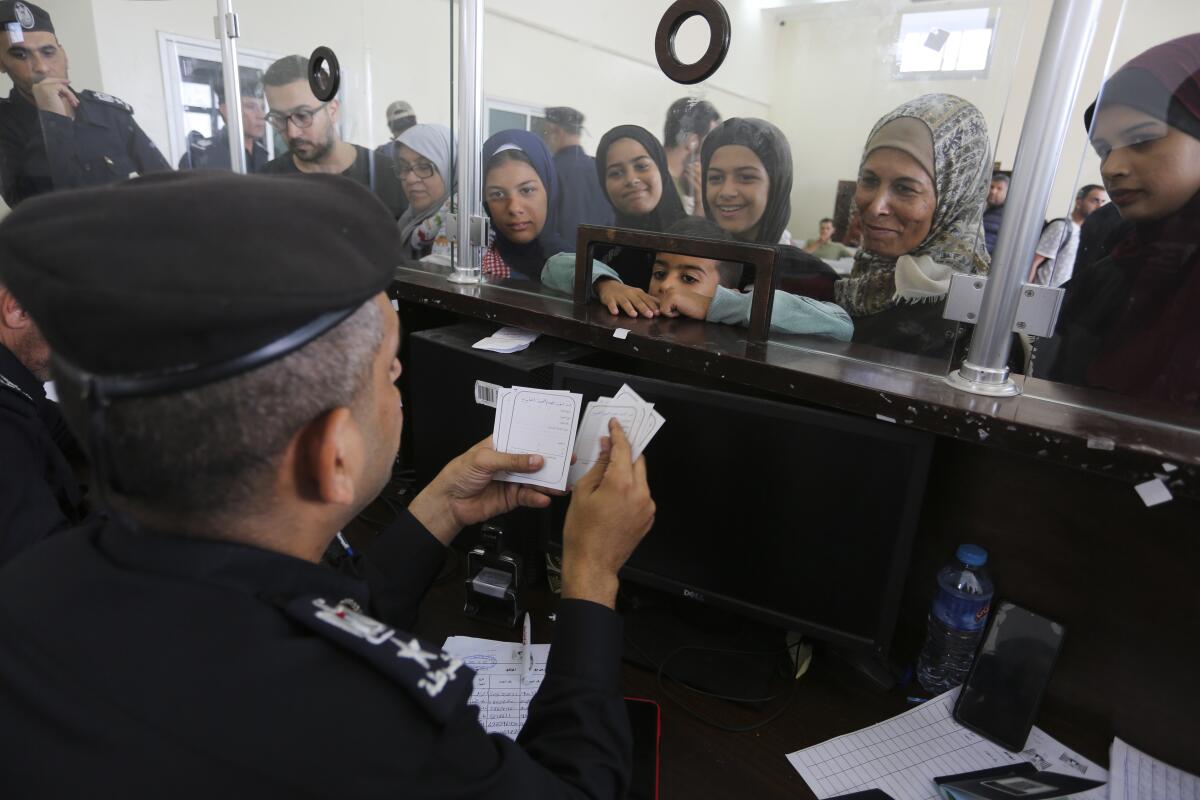
WASHINGTON — President Biden said Thursday that 74 U.S. citizens with dual citizenship have left the Gaza Strip, announcing the development as he dispatched his top diplomat to the Middle East for consultation with Israeli and Jordanian leaders concerning the Israel-Hamas war.
“We got out today 74 American folks that are dual citizens,” Biden said in a brief exchange with reporters as he hosted Dominican Republic President Luis Abinader for an Oval Office meeting.
The White House has previously said some 500 to 600 U.S. citizens had been trapped in Gaza since the start on Oct. 7 of the Israel-Hamas war. Since then, the nearly 4-week-old conflict continues to rage on with no end in sight.
The Biden administration said earlier this week that five Americans were among dozens of dual citizens who were able to get out of Gaza, which is in the midst of a humanitarian crisis. White House National Security Council spokesman John Kirby said that the administration was hopeful that additional U.S. citizens will be able to leave Gaza on Thursday and the pace of Americans who want to leave being allowed to cross into Egypt will now move at an accelerated pace.
Kirby said Qatar, which maintains lines of communication with Hamas, was particularly helpful in smoothing the way for the Americans to be able to leave Gaza.
Airstrikes flatten blocks of Gaza refugee camp, bringing rage, grief and a perilous new phase of war
Israel’s military says it killed a Hamas commander in devastating strikes in Jabaliya refugee camp in Gaza. Hospital chief describes ‘waterfall of casualties.’
Biden made the announcement as Secretary of State Antony J. Blinken set off for another trip to the Middle East. Blinken is returning to the region with a somewhat more nuanced message than he offered in the immediate aftermath of Hamas’ bloody attack on Israel and Israel’s military response.
As he did last month, Blinken will emphasize U.S. support for Israel and try to prevent a wider Mideast war as he visits Israel and Jordan starting on Friday. But Blinken’s agenda this time is more crowded and more complex as the conflict intensifies and the Biden administration grapples with competing domestic and international interests and anger.
He’ll push for the evacuation of more foreigners from Gaza and more humanitarian aid for the territory. He’ll press Israel to rein in violence against Palestinians in the occupied West Bank committed by Jewish settlers. And, he’ll stress the importance of protecting civilians — even though the administration has yet to offer any criticism of Israel for strikes that have killed thousands of civilians in Gaza.
Violence surges in the West Bank as Israel increases raids to root out militants. Palestinians say the military is using the war as an excuse to crack down.
“We will be talking about concrete steps that can and should be taken to minimize harm to men, women and children in Gaza,” Blinken told reporters as he departed. Further stops in the Middle East beyond Israel and Jordan are possible, “This is something that the United States is committed to.”
Blinken, while calling for brief pauses in airstrikes and fighting for humanitarian purposes is expected to continue to oppose growing calls for a broader cease-fire. Biden said Wednesday he thought there should be a humanitarian “pause” in the Israel-Hamas war in order to get “prisoners” out. Hamas militants took well over 200 hostages back to Gaza after its Oct. 7 attack, Israel says.
Israel-Hamas war: In a national vigil of sorts, Israelis hope for the return of more than 220 people seized by militants and believed held in Gaza.
Blinken will also be introducing a new element to the U.S. list of priorities: the need for Israel and its neighbors to begin to consider what a post-conflict Gaza will look like, who will govern it, how it can be made secure and how to establish an independent Palestinian state.
U.S. officials, including Biden and Blinken, have said repeatedly that they do not believe an Israeli re-occupation of Gaza is feasible, and Israel agrees. But what comes next has been little explored beyond brief comments Blinken made Tuesday in congressional testimony when he talked about the possibility of a revitalized Palestinian Authority and perhaps Arab states and international organizations playing a significant role in post-conflict Gaza.
While Palestinians are horrified by Israel’s war in Gaza, many are also angry with what they see as their own weak and useless official leadership.
On his trip, Blinken will speak about “the U.S. commitment to working with partners to set the conditions for a durable and sustainable peace in the Middle East to include the establishment of a Palestinian state that reflects the aspirations of the Palestinian people in Gaza and in the West Bank,” State Department spokesman Matthew Miller said.
The change in messaging reflects a shift in the international view of the war, of which Blinken has heard plenty since his last trip to the region, which included stops in Israel and six Arab states.
His itinerary after Jordan remains uncertain, although he will attend a Group of 7 foreign ministers meeting in Japan next week before traveling on to South Korea and India for much broader discussions, including on Russia’s war in Ukraine and China.
The shift in public opinion has been palpable. After receiving a wave of global sympathy after the Oct. 7 attacks, Israel now faces widespread criticism for its massive military response, something that many believe is fueling a worldwide spike in antisemitic violence as well as incidents targeting Muslims.
Weeks after Hamas militants paraded her nearly naked body, young Israeli festival-goer Shani Louk is confirmed dead. Many families still await news of their loved ones.
As the situation in Gaza deteriorates, U.S. officials are keenly aware that they risk severe damage in ties with the Arab world and beyond if the U.S. fails to use its influence with its close ally Israel to keep what’s already a humanitarian disaster from getting even worse.
Underscoring those concerns, Blinken will be flying into a diplomatic maelstrom between Israel and Jordan, which on Wednesday recalled its ambassador to Israel and told Israel’s envoy not to return to Amman. Jordan’s foreign minister said the decision would not be reconsidered until after the Gaza operation is stopped.
On Israel’s border with Lebanon, residents are worried that groups like Hezbollah will join a war that eventually spirals into a regionwide conflict.
Blinken, before departing on Thursday, stressed that the administration is concerned about the loss of innocent civilian lives in both Israel and Gaza.
“When I see a Palestinian child, a boy or girl, pulled from the rubble of a collapsed building, that hits me in the gut, as much as seeing a child in Israel or anywhere else,” Blinken said. “So, this is something that we have an obligation to respond to, and we will.”
Jordan, Egypt and Turkey, along with Arab Persian Gulf nations, are on tenterhooks as anger grows throughout the region over Israel’s tactics despite the horrific nature of the Oct. 7 attacks by Hamas and will be watching the visit closely.
Before leaving Washington, Blinken met on Wednesday with the Saudi defense minister, whose country has effectively suspended U.S.-mediated normalization talks with Israel. Neither man spoke as they posed for photos for roughly 10 seconds at the State Department.
AP correspondent Sagar Meghan and AP writers Colleen Long and Chris Megarian contributed reporting.
More to Read
Sign up for Essential California
The most important California stories and recommendations in your inbox every morning.
You may occasionally receive promotional content from the Los Angeles Times.


